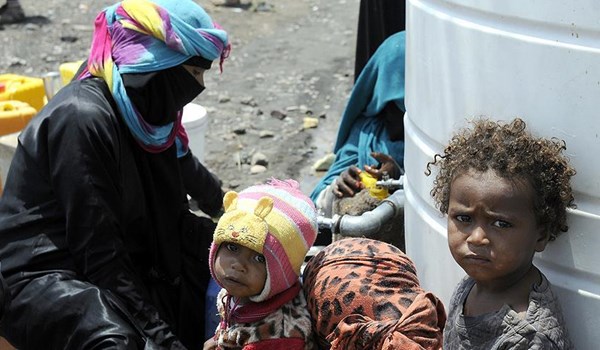
RNA - According to international aid groups, “medicines can't be brought in, so patient care is falling apart. Fuel shortages mean equipment doesn't work. It's a terrible downward spiral that puts thousands of lives at risk." The humanitarian situation is nothing short of catastrophic. The world needs to wake up to what is going on. Yemen is crumbling. As a matter of urgency, there must be free movement of goods into and across the country. Deliveries of food, water and medicine should be facilitated. Minds need to be focused to find a political solution - and quickly. Simply put, the Saudis don’t let this happen.
Nevertheless, the need for greater public awareness only increases as the unnecessary conflict deepens and expands to new areas. While the tragedy is reflected in much of the country’s new reality, another worrisome consequence grips the young children of Yemen. Some are coerced into fighting; others are either killed in airstrikes or driven by social, economic, political or other motives to take up guns. Sometimes it is a complex combination of all these, but the end result is the same in any case: Children are dying.
According to Fars news agancy, The horror stories are easy to find in most parts of the country, where families, many of them displaced, can barely cope with the astronomical prices for basic amenities like food and fresh water, and the long queues to purchase a few litres of fuel, if they are lucky.
If humanitarian relief doesn’t reach these families soon, the tragic stories will have many tellers and many more takers, but very few actors remaining to play their parts. For today, Yemen’s children stand scarred but resolute. They wait wearily in their dilapidated neighbourhoods, hoping to emerge from the rubble and return to their schools once again – once the US-backed, Saudi-led war ends.
As is, the war has created a humanitarian and political catastrophe. Since Saudi Arabia invaded the country in March 2015, the conflict has spiralled into an open, multiplayer regional war that has killed more than 17,000 people. For long stretches, Yemen’s seaports have been blockaded, threatening the food supply of an estimated half of the population of 24 million. Meanwhile, the number of displaced has lurched upward to several millions.
The conflict marks yet another unfortunate escalation in the region that will exacerbate security problems and political divisions. This time around, Arab governments and the United States should do everything they can to end their airstrikes before Yemen becomes another intractable killing field. Now, the United States and its allies have the opportunity to learn from recent missteps in Iraq and Syria, stop backing the Saudis, and take advantage of the halting negotiations that opened recently between the warring parties.
The next few months offer a narrow window to prioritize diplomacy over military action in a bid to shift worsening dynamics across the Middle East. Regional governments and multilateral organizations ought to take every conceivable diplomatic step available today to address the crisis. Otherwise, it could quickly turn into another Syria, an intractable, grinding conflict that destroys one nation, while implicating a raft of others in a conflict that has no good possible outcomes.
US support has emboldened the Saudi-led coalition in the conflict, and almost all members are already pursuing military options, including the UAE. While Yemen’s resistance factions fight the Saudi-led invaders, Al-Qaeda in the Arabian Peninsula (AQAP) and ISIL have been entirely spared foreign military strikes and are enjoying renewed latitude to operate.
The crisis poses many dangers. The most obvious lies in Yemen itself, where starvation has become endemic and an avoidable escalation of war could lead to a mass humanitarian tragedy. Security blowback is an equally intense strategic concern. AQAP has been one of the most active groups plotting international terrorist attacks, including against the border regions. The US-backed Saudi airstrikes and now the collapse of any central state authority, directly empower the terrorist groups and increase the threat to the entire region.
The war also has clear ramifications for its direct neighbours. Since March 2015, Saudi Arabia, acting out of a foreign policy that seeks expanding influence, has embarked on a coalition air war that has no discernible end game. Developments in Yemen are indeed linked to Saudi efforts to deepen their presence in the poorest country in the region. Critics paint the Saudi invasion as impulsive and slipshod and point out that Riyadh could not persuade the UN Security Council to endorse its illegality, let alone continue the war without the much-needed US support.
Doubtless, the US-backed, Saudi-made humanitarian crisis in Yemen has strained an already bad security climate. The current historical moment offers an opportunity for the United Nations and the international civil society to deploy diplomatic influence in a concerted and sustained manner. They are in the know that now is the time to force the Saudis to end their protracted war on Yemen and allow its people to determine their own future.
847/940